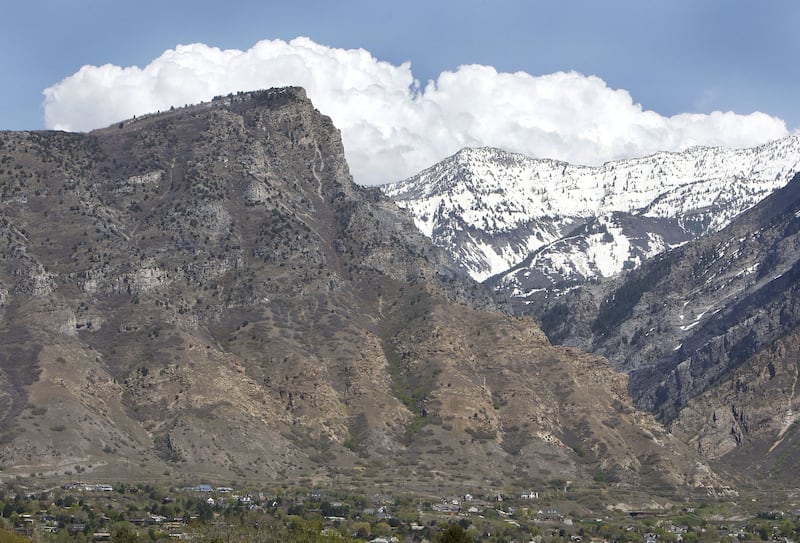SALT LAKE CITY — While the country continues to undergo an awakening to the racially insensitive symbols and terms that still exist in our culture, one word has stuck around with little attention in Utah — until now.
“I’ve heard it all my life growing up, especially when I was a younger person in school. And people used to refer to our Native women as ‘squaws.’ And it seemed to be, the way they were saying it, was derogatory and insensitive and belittling our Native women,” said Ed Naranjo, a member of the Goshute Reservation on the border of Utah and Nevada.
“And it stuck with me, and people just continue to use it. And I see references to it occasionally,” Naranjo said.
Every time he saw the word on a map — it appears in Utah across 56 different geographic locations, including the well-known Squaw Peak in Provo — or referenced in a book, he became increasingly angry.
Naranjo finally decided: “We’ve got to do something about this.”
Changing a name
About three years ago, Naranjo wrote a letter to state Sen. Jani Iwamoto, D-Holladay, explaining the issue. After a lengthy process, Iwamoto is introducing a bill that would lay out a path to rename places throughout the state that contain words offensive to the Native American culture.
“It’s an important issue because ... it may be a Native American word to describe a woman, but this word does not originate in any tribal languages in Utah or surrounding states,” Iwamoto noted.
“Now it’s a word describing Native American women as promiscuous, and associated with sexual violence,” she said.
Throughout the country, 1 in 3 Native American women will suffer sexual or domestic violence in their lives, Iwamoto said, and those rates are also high in Utah.
“Names like squaw perpetuate this harmful action against Native American women,” she said.
Iwamoto said the issue especially resonates with her because of the way derogatory terms for Japanese people make her feel.
The Place Name Amendments bill would enable the Utah Division of Indian Affairs to create an application template for tribes, counties and communities to use to apply for names to be changed. Anyone could bring up the idea of changing a place name, but it would need the approval of municipal leaders, Iwamoto said.
Those seeking a name change will also need to solicit feedback from tribal governments that are connected to the location. If the change gets approved by the state, it will go before the federal government for approval, as many of the areas are federal land.
The bill received a favorable recommendation from the Native American Legislative Liaison Committee in October, and will be reviewed in hearings during the upcoming legislative session that starts in January.
Currently, Utah doesn’t have “a really clear template” for changing a place name, Iwamoto said during the interim committee meeting.
“And what this legislation does is it gives local control to the areas, or municipalities, where they want to make these changes, and we are giving them these guidelines on how to do so,” Iwamoto said.
‘It’s not a word from tribes in this area’
Both the Merriam-Webster and Oxford dictionaries describe the word squaw as an offensive, dated term for a Native American woman. Scholars believe it was picked up by white settlers who heard it from a Connecticut Algonquian tribe, and originally meant a female or young woman.
The word also belongs to a semantic set of terms that have been used to refer to Native Americans, including “buck” and “papoose,” which is “unusual among terms for ethnic groups, in that it has separate lexical items to distinguish male, female and young,” wrote William Bright, who was an honorary professor emeritus of linguistics at the University of Colorado.
Bright said the pattern “seems to group” Native Americans with animals rather than other human groups, especially as the word “buck” usually refers to male deer.
Shaina Snyder, a member of Native American advocacy groups Repeak Committee and Dine Bikeyah, said she’s working with others to get the name of Provo’s Squaw Peak changed.
“Currently, there are over 574 federally recognized tribes in the U.S. with their own languages and dialects. The word squaw may be a word from a tribe in the northeastern United States, but it’s not a word from the vocabulary of any of the tribes in this area,” Snyder explained during the legislative meeting.
During the 1800s, the word came to Utah during the “mountain man era,” Snyder said.
“It was used to describe women who were offered as prostitutes during the mountain man rendezvous, and later to describe women who worked in prostitution or outside of military forts,” she said.
Naranjo said he feels hopeful change will occur due to the bill, and he’s happy “that somebody is taking the interest in this and pushing it forward.”
“My daughters, most recently my granddaughters, they asked, ‘Why does somebody call me a squaw? What does that mean?’ And it just hits your heart. How do you explain it to your child other than people are just that way, and they are negative,” Naranjo said.
“You don’t want to spread that kind of message to young kids because they are learning a lot, and if we tell them that these people are mean and they just don’t care, that they are prejudiced, they might just grow up thinking that that’s how a lot of people are,” he said.
Iwamoto described the effort to change the offensive geographic names not as a way to alter the past, but “to begin the process of trust” with the Native American community.
‘You can’t undo the past, of course, but you can change how you treat each other in the future,” Iwamoto said.
Utah won’t be the first state to consider removing the word squaw. In August, a Lake Tahoe ski resort announced it is dropping the name Squaw Valley. A new name has not yet been announced.


